中考英语祈使句讲解及练习 (1)
- 格式:doc
- 大小:33.50 KB
- 文档页数:3
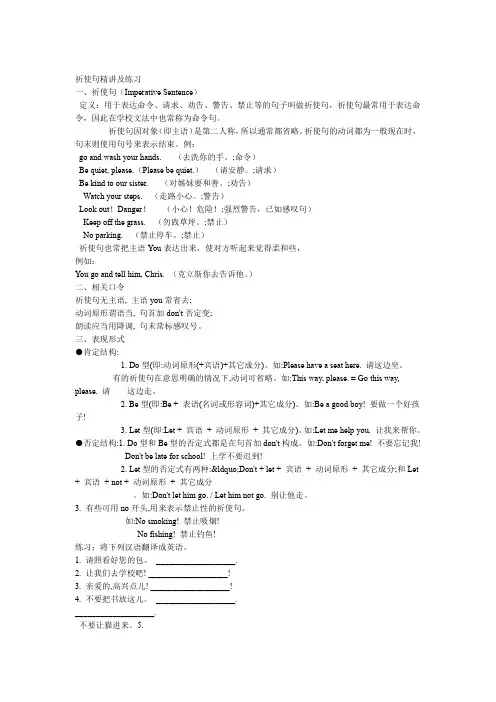
祈使句精讲及练习一、祈使句(Imperative Sentence)定义:用于表达命令、请求、劝告、警告、禁止等的句子叫做祈使句,祈使句最常用于表达命令,因此在学校文法中也常称为命令句。
祈使句因对象(即主语)是第二人称,所以通常都省略。
祈使句的动词都为一般现在时,句末则使用句号来表示结束。
例:go and wash your hands. (去洗你的手。
;命令)Be quiet, please.(Please be quiet.)(请安静。
;请求)Be kind to our sister. (对姊妹要和善。
;劝告)Watch your steps. (走路小心。
;警告)Look out!Danger!(小心!危险!;强烈警告,已如感叹句)Keep off the grass. (勿践草坪。
;禁止)No parking. (禁止停车。
;禁止)祈使句也常把主语You表达出来,使对方听起来觉得柔和些,例如:You go and tell him, Chris. (克立斯你去告诉他。
)二、相关口令祈使句无主语,主语you常省去;动词原形谓语当,句首加don't否定变;朗读应当用降调,句末常标感叹号。
三、表现形式●肯定结构:1. Do型(即:动词原形(+宾语)+其它成分)。
如:Please have a seat here. 请这边坐。
有的祈使句在意思明确的情况下,动词可省略。
如:This way, please. = Go this way, please. 请这边走。
2. Be型(即:Be + 表语(名词或形容词)+其它成分)。
如:Be a good boy! 要做一个好孩子!3. Let型(即:Let + 宾语+ 动词原形+ 其它成分)。
如:Let me help you. 让我来帮你。
●否定结构:1. Do型和Be型的否定式都是在句首加don't构成。
如:Don't forget me! 不要忘记我!Don't be late for school! 上学不要迟到!2. Let型的否定式有两种:“Don't + let + 宾语+ 动词原形+ 其它成分;和Let + 宾语+ not + 动词原形+ 其它成分。
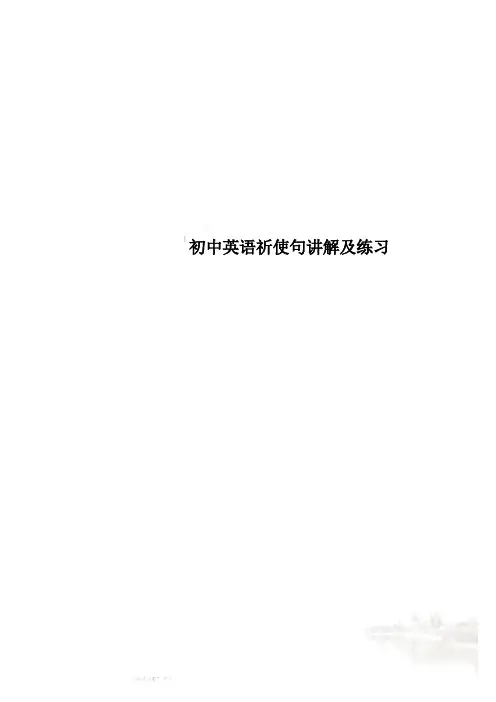
初中英语祈使句讲解及练习初中英语――祈使句祈使句指的是表示命令、请求、建议或劝告的句子。
其主语you常省略,谓语动词用原形,句末用感叹号或句号,读降调。
1. 肯定的祈使句(1)动词原形+其他Stand up, please. = Please stand up. 请起立。
(2)Be + n./adj.Be a good boy! 要做一个好孩子! Be careful! = Look out! = Take care! 小心/ 当心!(3)Let + 宾语+ 动词原形+ 其它成分Let me help you. 让我来帮你。
Let’s go to school together. 咱们一起上学去吧。
2. 否定的祈使句(1) Don't + 动词原形Don't stand up. 别站起来。
Don't be careless. 别粗心。
Don't let them play with fire. 别让他们玩火。
(2)Let型的否定式有两种:“Don't + let + 宾语+ 动词原形+ 其它成分”和“Let + 宾语如:--- Don’t go out, please. It’s raining heavily outside. 请不要出去。
外面雨下得很大。
---- Yes, I will. I have to meet my brother at the airport. 不行,我得去机场接我弟弟。
5. 祈使句的反意疑问句(1) 肯定祈使句的反意疑问句反问部分用will you 或won't you。
Please open the do or, will/ won’t you? 请把门打开,好吗?(2) 否定祈使句的反意疑问句反问部分只用will you。
Don't be late again, will you? 别再迟到了,行不行?(3) 以let's开头的祈使句反意疑问句反问部分用shall we。
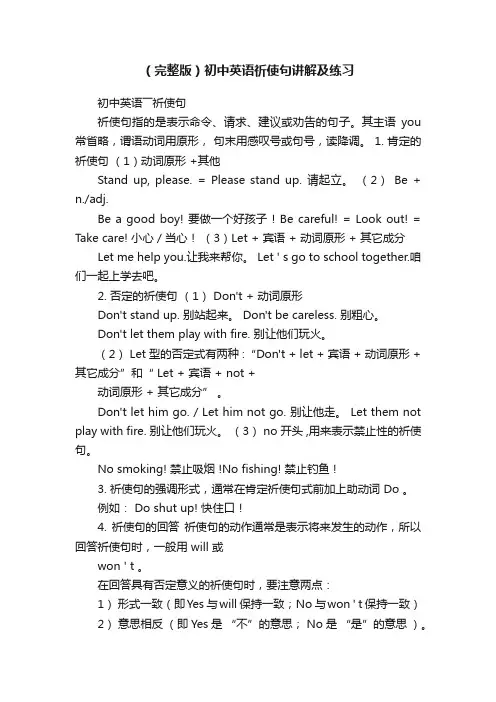
(完整版)初中英语祈使句讲解及练习初中英语――祈使句祈使句指的是表示命令、请求、建议或劝告的句子。
其主语you 常省略,谓语动词用原形,句末用感叹号或句号,读降调。
1. 肯定的祈使句(1)动词原形 +其他Stand up, please. = Please stand up. 请起立。
(2)Be + n./adj.Be a good boy! 要做一个好孩子 ! Be careful! = Look out! = Take care! 小心 / 当心!(3)Let + 宾语 + 动词原形 + 其它成分Let me help you.让我来帮你。
Let ' s go to school together.咱们一起上学去吧。
2. 否定的祈使句(1) Don't + 动词原形Don't stand up. 别站起来。
Don't be careless. 别粗心。
Don't let them play with fire. 别让他们玩火。
(2) Let 型的否定式有两种:“Don't + let + 宾语 + 动词原形 + 其它成分”和“ Let + 宾语 + not +动词原形 + 其它成分” 。
Don't let him go. / Let him not go. 别让他走。
Let them not play with fire. 别让他们玩火。
(3) no 开头 ,用来表示禁止性的祈使句。
No smoking! 禁止吸烟 !No fishing! 禁止钓鱼 !3. 祈使句的强调形式,通常在肯定祈使句式前加上助动词 Do 。
例如: Do shut up! 快住口!4. 祈使句的回答祈使句的动作通常是表示将来发生的动作,所以回答祈使句时,一般用 will 或won ' t 。
在回答具有否定意义的祈使句时,要注意两点:1)形式一致(即Yes 与will 保持一致;No 与won ' t 保持一致)2)意思相反(即 Yes 是“不”的意思; No 是“是”的意思)。
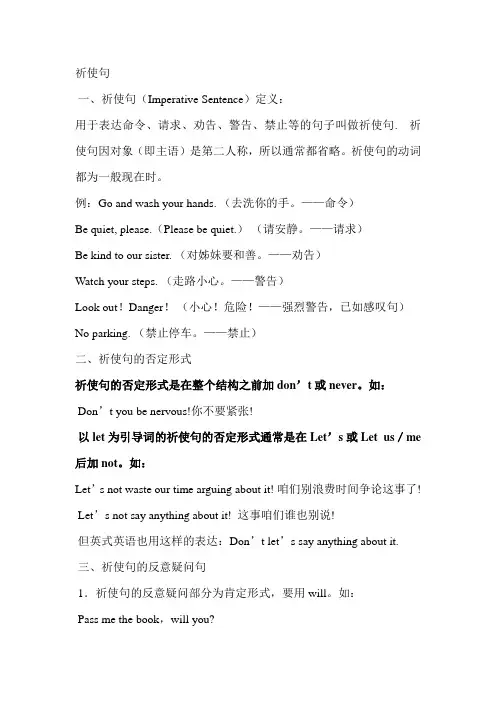
祈使句一、祈使句(Imperative Sentence)定义:用于表达命令、请求、劝告、警告、禁止等的句子叫做祈使句. 祈使句因对象(即主语)是第二人称,所以通常都省略。
祈使句的动词都为一般现在时。
例:Go and wash your hands. (去洗你的手。
——命令)Be quiet, please.(Please be quiet.)(请安静。
——请求)Be kind to our sister. (对姊妹要和善。
——劝告)Watch your steps. (走路小心。
——警告)Look out!Danger!(小心!危险!——强烈警告,已如感叹句)No parking. (禁止停车。
——禁止)二、祈使句的否定形式祈使句的否定形式是在整个结构之前加don’t或never。
如:Don’t you be nervous!你不要紧张!以let为引导词的祈使句的否定形式通常是在Let’s或Let us/me 后加not。
如:Let’s not waste our time arguing about it! 咱们别浪费时间争论这事了! Let’s not say anything about it! 这事咱们谁也别说!但英式英语也用这样的表达:Don’t let’s say anything about it. 三、祈使句的反意疑问句1.祈使句的反意疑问部分为肯定形式,要用will。
如:Pass me the book,will you?2.Let’s表示第一人称的祈使句,反意疑问句为“Shall we?”。
如: Let’s go for a walk,shall we?Let’s forget it,shall we?3.Let me和Let us 表示第二人称的祈使句,反意疑问句为“will you?”。
如:Let us go for a walk,will you?4.其它行为动词引起的祈使句,无论其陈述部分是否定还是肯定的祈使句,多用“will you?”,表一种客气的语气。
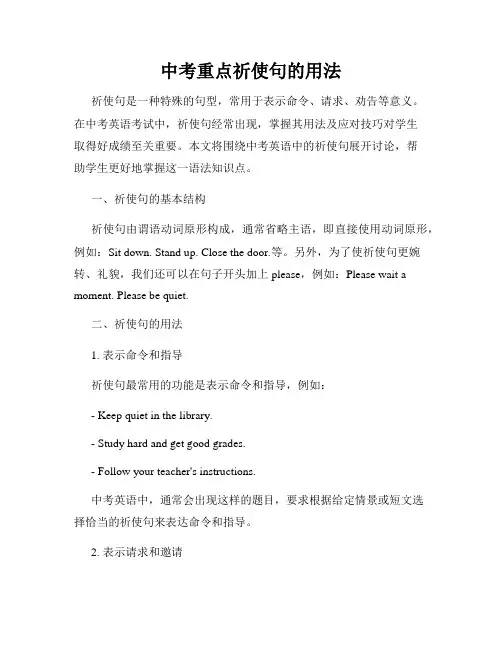
中考重点祈使句的用法祈使句是一种特殊的句型,常用于表示命令、请求、劝告等意义。
在中考英语考试中,祈使句经常出现,掌握其用法及应对技巧对学生取得好成绩至关重要。
本文将围绕中考英语中的祈使句展开讨论,帮助学生更好地掌握这一语法知识点。
一、祈使句的基本结构祈使句由谓语动词原形构成,通常省略主语,即直接使用动词原形,例如:Sit down. Stand up. Close the door.等。
另外,为了使祈使句更婉转、礼貌,我们还可以在句子开头加上please,例如:Please wait a moment. Please be quiet.二、祈使句的用法1. 表示命令和指导祈使句最常用的功能是表示命令和指导,例如:- Keep quiet in the library.- Study hard and get good grades.- Follow your teacher's instructions.中考英语中,通常会出现这样的题目,要求根据给定情景或短文选择恰当的祈使句来表达命令和指导。
2. 表示请求和邀请祈使句还可以表示请求和邀请,具体要根据语境来判断是请求还是命令,例如:- Open the window, please. (请求)- Help me with my homework, please. (请求)- Have a seat, please. (邀请)3. 表示忠告和建议祈使句还可以表示忠告和建议,用以给予他人一些建议或提醒,例如:- Be careful when crossing the street.- Brush your teeth twice a day.- Don't waste water.这类题目通常要求学生根据给定情景或短文判断出其中包含的忠告和建议,并选择合适的祈使句。
三、应对技巧在中考英语中,我们应该掌握一些应对技巧,以便更好地应对与祈使句相关的题目。

一、祈使句(Imperative Sentence)●定义:用于表达命令、请求、劝告、警告、禁止、祝愿等的句子叫做祈使句。
祈使句最常用于表达命令,因此在学校语法中也常称为命令句。
祈使句因对象(即主语)是第二人称,所以通常都省略。
但为了加强语气有时可以加上主语you 或增加称呼。
祈使句的动词都为一般现在时,句末则使用句号或感叹号来表示结束。
Go and wash your hands. 去洗你的手。
(命令)Be quiet, please. = Please be quiet. 请安静。
(请求)Be kind to our sister. 对姐妹要和善。
(劝告)Watch your steps. 走路小心。
(警告)Look out!Danger!小心!危险!(强烈警告,已如感叹句)Keep off the grass. 勿践草坪。
(禁止)No parking. 禁止停车。
(禁止)Have a good trip!(祝愿)●祈使句的形式(1)祈使句的肯定句:Do型(行为动词)动词原形+(宾语)+其他Please have a seat here. 请这边坐。
Be型Be+表语(名词或形容词)+其他Be a good child. 做个好孩子!Let型Let+宾语+动词原形+其他Let me help you. 让我来帮你。
Let’s+动词原形表建议,“让我们…”。
Let’s go fishing this Sunday.让我们这个礼拜日去钓鱼。
祈使句分为第二人称祈使句,这种祈使句的主语you通常不表示出来,而是已动词原形开头;第一人称祈使句和第三人称祈使句,这类祈使句通常是以例题精讲祈使句let为引导词表示建议。
(2)祈使句的否定句:①Do型和Be型的否定是在句首加don’t(或never);Don’t forget me!Don’t be late for school!Don’t be in such a hurry. 别那么忙。

(五)祈使句一. 祈使句的句式特征祈使句常常是表达说话人对对方的劝告、叮嘱、请求或命令等。
因此,祈使句中一般没有主语,但根据其句意,实际上是省略了主语you。
祈使句句末用感叹号或句号,朗读时,常用降调。
在表达请求或劝告时,在祈使句前或句末可加上please,以使句子的语气更加缓和或客气。
祈使句一般没有时态的变化,也不能及情态动词连用。
例如:Keep off the grass!勿踩草地!Put the boxes in the small room.把那些盒子放到那个小房间里。
二. 祈使句的肯定句式祈使句的肯定句式一般分为以下三种类型:1. 行为动词原形+其他成分。
例如:Make sentences after the model.根据例句造句。
2. Be动词+其他成分(形容词、名词或介词短语等)。
例如:Be careful when crossing the street.过马路时要小心。
3. Let+宾语+动词原形+其他成分。
例如:Let him go back now.让他现在回去吧。
三. 祈使句的否定句式祈使句的否定句式,通常情况下在句首加上Don’t或Never,一般分为以下四种类型:1. 在祈使句的肯定句式前加Don’t,构成“Don’t+行为动词原形+其他成分”。
例如:Don’t say that again!别再那样说了!2. 在Be动词引起的肯定祈使句前加Don’t,构成“Don’t be +其他成分(形容词、名词或介词短语等)”。
例如:Don’t be careless.不要粗心。
注意:在这种句型中be不能省略;否定副词not不可置于be之后。
3. Let引起的祈使句的否定形式有两种:(1)Let开头的祈使句,如果后面跟第一、第三人称名词或代词的宾格,可在Let前加Don’t,也可在Let后宾格的名词或代词后面加not。
(2)如果以Let’s开头的祈使句,必须在Let’s后加not。
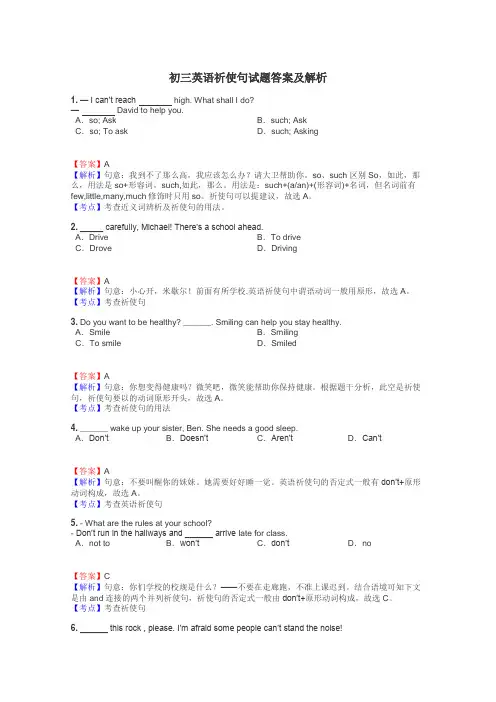
初三英语祈使句试题答案及解析1.—I can’t reach high. What shall I do?— David to help you.A.so; Ask B.such; AskC.so; To ask D.such; Asking【答案】A【解析】句意:我到不了那么高,我应该怎么办?请大卫帮助你。
so、such 区别So,如此,那么,用法是so+形容词,such,如此,那么。
用法是:such+(a/an)+(形容词)+名词,但名词前有few,little,many,much修饰时只用so。
祈使句可以提建议,故选A。
【考点】考查近义词辨析及祈使句的用法。
2._____ carefully, Michael! There’s a school ahead.A.Drive B.To driveC.Drove D.Driving【答案】A【解析】句意:小心开,米歇尔!前面有所学校.英语祈使句中谓语动词一般用原形,故选A。
【考点】考查祈使句3. Do you want to be healthy? ______. Smiling can help you stay healthy.A.Smile B.SmilingC.To smile D.Smiled【答案】A【解析】句意:你想变得健康吗?微笑吧,微笑能帮助你保持健康。
根据题干分析,此空是祈使句,祈使句要以的动词原形开头,故选A。
【考点】考查祈使句的用法4. ______ wake up your sister, Ben. She needs a good sleep.A.Don’t B.Doesn’t C.Aren’t D.Can’t【答案】A【解析】句意:不要叫醒你的妹妹。
她需要好好睡一觉。
英语祈使句的否定式一般有don’t+原形动词构成,故选A。
【考点】考查英语祈使句5. - What are the rules at your school?- Don’t run in the hallways and ______ arrive late for class.A.not to B.won’t C.don’t D.no【答案】C【解析】句意:你们学校的校规是什么?——不要在走廊跑,不准上课迟到。
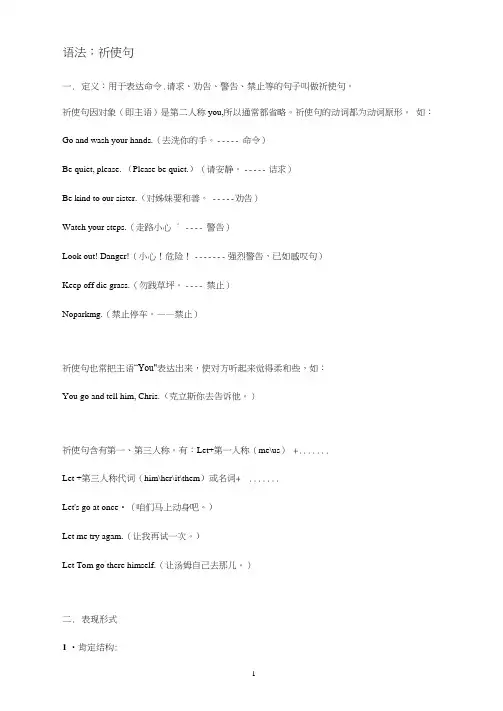
语法:祈使句一.定义:用于表达命令.请求、劝告、警告、禁止等的句子叫做祈使句。
祈使句因对象(即主语)是第二人称you,所以通常都省略。
祈使句的动词都为动词原形。
如:Go and wash your hands.(去洗你的手。
----- 命令)Be quiet, please. (Please be quiet.)(请安静。
----- 诘求)Be kind to our sister.(对姊妹要和善。
----- 劝告)Watch your steps.(走路小心° ---- 警告)Look out! Danger!(小心!危险!------- 强烈警告,已如感叹句)Keep off die grass.(勿践草坪。
---- 禁止)Noparkmg.(禁止停车。
——禁止)祈使句也常把主语“You"表达出来,使对方听起来觉得柔和些,如:You go and tell him, Chris.(克立斯你去告诉他。
)祈使句含有第一、第三人称。
有:Let+第一人称(me\us) + .......Let +第三人称代词(him\her\it\them)或名词+ .......Let's go at once•(咱们马上动身吧。
)Let me try agam.(让我再试一次。
)Let Tom go there himself.(让汤姆自己去那儿。
)二.表现形式1 •肯定结构:(1) Do型(即:动词原形(+宾语)+其它成分)。
如:Please have a seat here.请这边坐。
有的祈使句在意思明确的情况下,动词可省略。
女口:Tins way, please. = Go this way, please, i青这边走。
【注】有时,为了加强语气,可以在动词之前加doDo sit down.务必请坐。
Do study hard. 一泄要努力学习。
⑵Be型(即:Be +表语(名词或形容词)+其它成分)。
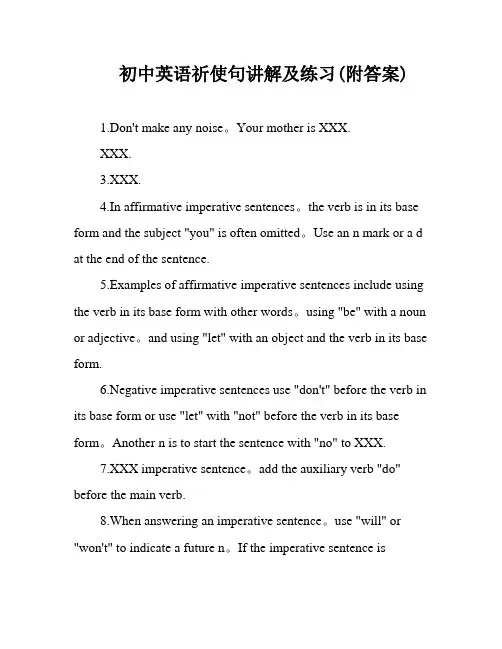
初中英语祈使句讲解及练习(附答案)1.Don't make any noise。
Your mother is XXX.XXX.3.XXX.4.In affirmative imperative sentences。
the verb is in its base form and the subject "you" is often omitted。
Use an n mark or a d at the end of the sentence.5.Examples of affirmative imperative sentences include using the verb in its base form with other words。
using "be" with a noun or adjective。
and using "let" with an object and the verb in its base form.6.Negative imperative sentences use "don't" before the verb in its base form or use "let" with "not" before the verb in its base form。
Another n is to start the sentence with "no" to XXX.7.XXX imperative sentence。
add the auxiliary verb "do" before the main verb.8.When answering an imperative sentence。
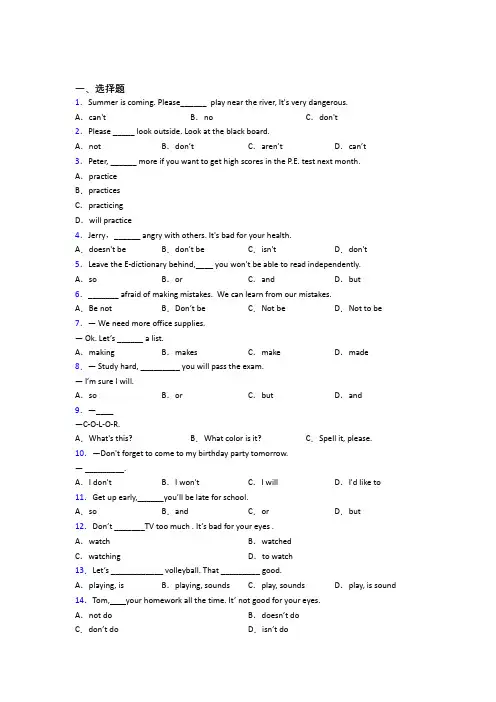
一、选择题1.Summer is coming. Please______ play near the river, It's very dangerous.A.can't B.no C.don't2.Please _____ look outside. Look at the black board.A.not B.don’t C.aren’t D.can’t 3.Peter, ______ more if you want to get high scores in the P.E. test next month. A.practiceB.practicesC.practicingD.will practice4.Jerry,______ angry with others. It's bad for your health.A.doesn't be B.don't be C.isn't D.don't 5.Leave the E-dictionary behind,____ you won't be able to read independently.A.so B.or C.and D.but6._______ afraid of making mistakes. We can learn from our mistakes.A.Be not B.Don’t be C.Not be D.Not to be 7.— We need more office supplies.—Ok. Let’s ______ a list.A.making B.makes C.make D.made 8.— Study hard, _________ you will pass the exam.—I’m sure I will.A.so B.or C.but D.and 9.—____—C-O-L-O-R.A.What's this? B.What color is it? C.Spell it, please. 10.—Don't forget to come to my birthday party tomorrow.— _________.A.I don't B.I won't C.I will D.I'd like to 11.Get up early,______you’ll be late for school.A.so B.and C.or D.but 12.Don’t _______TV too much . It’s bad for your eyes .A.watch B.watchedC.watching D.to watch13.Let’s ____________ volleyball. That _________ good.A.playing, is B.playing, sounds C.play, sounds D.play, is sound 14.Tom, your homework all the time. It’ not good for your eyes.A.not do B.doesn’t doC.don’t do D.isn’t do15.---Mike, ___________ run in the hallways.一Sorry, Ms. Clark.A.don't B.doesn't C.let's D.please 16.Work hard, ________ you’ll have a big success.A.and B.but C.or D.for 17.—Let’s______ to the songs at the Beach Music Festival this Friday night.—Good idea! I like music.A.listening B.listen C.listens D.to listen 18.Dave, late for class again and you must follow the school rules.A.doesn't arrive B.arrives C.don't arrive 19.—Miss Green, would you please tell me how to improve my English?—_____ a study group, and you’ll get help from others.A.Join B.Joining C.To join D.If you join 20.—Don’t wake up your sister, Ben. She needs a good sleep. — ___________ . A.OK, I don’t.B.Yes, I do.C.OK, I won’t.D.Yes, I will.21.________ hard, and you will be ________.A.To study; best B.Study; best C.Studying; the best D.Study; the best 22.—Don’t forget to call me when you arrive there.—________.A.No, I won’t B.Yes, I have C.You’re welcome D.No, thanks 23.—I am feeling ill. What should I do?— eating junk food and breakfast every day.A.Stop; having B.Stop; have C.To stop; have. D.To stop; to have 24.Alice, it's time for school. Let me _______, or I will be late for class.A.go B.come C.to go D.to come 25.“Sally, ________ afraid of making mistakes in your composition,” said the teacher. A.not be B.don’t be C.be not D.not to be【参考答案】***试卷处理标记,请不要删除一、选择题1.C解析:C【解析】【详解】句意:夏天要来了,请不要在河附近玩耍,它很危险。
中考英语-祈使句例题详解-全1.祈使句定义:祈使句表示请求、命令、叮嘱、号召等,谓语动词用原形,主语通常是不表示出来。
2.析使句的肯定结构例如:Open the door please!Let me do it!Let's go to the cinema together!3.祈使句的否定结构否定形式:多以don't引起;也可用never引起。
例如:Don't be late for school!Don't waste any time please!Never give up!No加名词/动名词NO PHOTOS!禁止照相!NO PARKING!禁止停车!4.注意事项:(1)以let's引起的句子也是一种祈使句,表示建议。
(2)let’s引起的否定句是在let’s后加not构成。
(3)反义疑问句:除了Let’s ……,shall we? 之外,基本都用will you? (4)回答祈使句时要用将来时。
如:—Please remember to take the dog out for a walk every day. 请记住每天带着狗散步。
—Yes, I will. 好的,我会的。
—Do not take your mobile phone to school. 不要把手机带到学校来!—Sorry, I will not. 对不起,我不会了。
(5)掌握“祈使句加and/or加结果状语”结构。
如:Work harder, and you will get good grades. 努力吧,你就会取得好成绩。
Hurry up, or you will be late for class. 快点啊,要不然上课就迟到了。
(6)特殊情况:a)有时为了指明是向谁提出的请求或命令,主语也可以表达出来,也可以加称呼语。
b)有时主语表示出来只是为了加强语气,或是表达“不高兴”“厌烦”“鄙视”等情绪。
专题讲解祈使句及练习Last revision on 21 December 2020祈使句一祈使句的用法。
1.祈使句的概念。
祈使句表命令、警告、提醒、建议、请求、叮嘱、号召等,谓语动词用原形。
主语you通常省略,句末用感叹号或句号,例如:Knock at the door before entering, please!进来时请敲门!(建议)Look out! There is a train coming.注意!火车来了!(提醒)Wear strong shoes as we shall do a lot of walking.请穿结实的鞋子,因为我们要走许多的路。
(叮嘱)Put on your coat at once. We must hurry.立刻穿上衣服,我们必须快点(命令)Give blood if you can and many lives will be saved.如果你能,来献血吧,这会挽救很多人的生命。
(号召)2.祈使句的分类。
祈使句分为第二人称祈使句,第一人称祈使句和第三人称祈使句。
二.第二人称祈使句是以听话人为祈使对象的祈使句,通常用来向听话者发出命令,提出要求或建议。
这种祈使句的主语you通常不表示出来,而是已动词原形开头,例如:Keep quiet, please!Open the door, please!Hurry up!3.第一人称祈使句是一第一人称代词作为祈使句的对象,这类祈使句通常是以let为引导词表示建议。
句子结构为let+me/us+动词原形,例如:Let’s go out and play!让我们出去玩吧。
Let’s play a guessing game!我们来玩猜谜游戏吧。
Let me have a look!让我来看一看。
Let me tell you!让我来告诉你。
4.第三人称祈使句是以第三人称代词或者名词等作为祈使的对象,以let为引导词,句子结构为let+him/her/it/them/名词+动词原形,例如:Let him be here by 10 o’clock.让他十点前来这儿。
一、选择题1.The window is . Mike, go and it.A.open; closed B.close; opens C.open; close D.closed; opens 2.—_____________ dressed now! We have to go in ten minutes.—OK, Mom.A.Getting B.Get C.To get D.Gets3.— Please ________very quiet. They___________ .— OK, I will.A.to be; sleep B.be; are sleepingC.to be; are sleeping D.be; sleeps4.Don’t________ in the classroom. It’s important ________ quiet when you study. A.talk, keep B.to talk, keep C.talk, to keep D.to talk, to keep 5.Mike, __________ make any noise, your father is sleeping.A.not B.don't C.won't D.can't 6.Please _____ look outside. Look at the black board.A.not B.don’t C.aren’t D.can’t7.The teacher often says, “ _____ late for school. ”A.Don’t B.Don’t be C.Not D.Doesn’t8.Get up early, _____ you’ll be late for class.A.so B.or C.and D.but 9.—Hurry up, you will miss the first train of Beijing S2!—OK. I can't wait to see the Great Wall.A.or B.so C.and D.But 10.Leave the E-dictionary behind,____ you won't be able to read independently.A.so B.or C.and D.but11.Let’s ______ sports after school. Sports are good for health.A.have B.having C.to have D.has12.________ for the English test or you will miss the listening part.A.Don’t late B.Don’t be late C.Don’t arrive lately 13.Take more exercise, you will be healthier.A.but B.or C.and14.—Don’t forget to call me when you arrive there.—________.A.No, I won’t B.Yes, I have C.You’re welcome D.No, thanks 15.-Let's make fruit salad.- _____________ .A.No,I'm not B.Thank you C.That's all right D.That's a good idea 16.We can’t get in. It says “________” on the sign.A.No smoking B.No touchingC.No entry D.No shouting17.Tom, laugh at(嘲笑)others. It’s not polite!A.don't B.doesn’t C.not D.don't be18.---Mike, ___________ run in the hallways.一Sorry, Ms. Clark.A.don't B.doesn't C.let's D.please19.me a chance and I’ll bring you a surprise.A.Give B.Giving C.Gives D.To give20.__________ shouting, please! It's against the rules.A.Don't B.Not C.No21.—Miss Green, would you please tell me how to improve my English?—_____ a study group, and you’ll get help from others.A.Join B.Joining C.To join D.If you join 22.Let's __________ tennis in the playground.()A.play B.to play C.plays D.to plays23.o music to make you feel happy when you are sad.A.To listen B.Listens C.Listening D.Listen24.________ any more. It’s no use. We will not buy you any chocolate.A.You don’t cry B.If you cry C.Don’t cry D.Stop crying 25.Do more exercise every day, ________ you’ll be stronger than before.A.but B.for C.and D.or【参考答案】***试卷处理标记,请不要删除一、选择题1.C解析:C【解析】句意:窗户开着。
英语语法祈使句讲解英语语法祈使句讲解1祈使句祈使句主要用来表达恳求、指令、建议、嘱咐或祝福等。
祈使句通常省略主语(you),但为了加强语气有时可以加上主语you 或增加称呼。
例:You be quick!你快点吧!Be quiet, girls!姑娘们,清静点儿!Have a good trip!(祝你)旅行开心!1. 句式a)行为动词开头的祈使句。
例:Sit down. 坐下吧!Come in. 进来!Speaking loudly.大点声说!b)Be开头的祈使句,后常加形容词(系词开头)Be careful! 留神!Be quick! 快点!Be quiet! 清静点!Keep silent! 清静!c)Let…开头的祈使句Let me carry the box for you.让我替你拿这只箱子吧!Let the boy go home.让这个男孩回家。
Let the teacher in first.让老师先进去。
Let‘s+动词原形表建议,让我们…。
例:Let’s go fishing this Sunday.让我们这个礼拜日去钓鱼。
Let‘s have a rest.让我们休息一会。
Let‘s stay here.让我们留下来吧!Let‘s = Let us. Let us 不同语境有不同的含义。
Let‘s “请让我们(咱们…),包括谈话的对方。
”例:Let’s go out and play football.咱们出去踢足球吧!Let‘s have a rest!咱们休息一会吧!Let us 意为“请让我们……”表示盼望得到对方允许,不包括对方。
Let us buy you a drink.给你买杯饮料吧!Let us go. (Don‘t stop us going.)请让我们走吧!2. 祈使句的否认式,在句首加don‘t,常用缩略式。
例:Don’t be late for school.上学别迟到。
英语祈使句详解1. 祈使句的概念表示请求、命令、建议、祝愿、邀请或要求的句子叫祈使句。
用于祈使句句首的动词总是用原形,不能用其他形式。
如:Shut the door! 把门关上!Have a cup of coffee! 喝杯咖啡吧!Let them go by train. 叫他们坐火车去吧。
祈使句的主语通常为第二人称(you),但一般都被省略,只有在特殊的情况下才把主语(you)补充出来。
如:You be quiet! 你安静! You go and tell him, Chris. 克立斯,你去告诉他。
You wait here for a moment. 你在这儿等一会儿。
有时祈使句的主语也可以是everybody, somebody, anybody, nobody等不定代词。
如:Stand up, everybody! 全体起立!Nobody move. 任何人都不许动。
2. 祈使句表示强调为了加强祈使句的语气,我们通常是在祈使句的动词原形前加上助动词do,此时通常译为“一定”“务必”等。
如:Do be careful. 务必要小心。
Do let me go. 一定让我去。
副词never和always有时可用于祈使句句首,表示强调。
如:Never do that again. 再不要这样做了。
Always look in the mirror before starting to drive. 一定要先看看反光镜再开车。
3. 祈使句的否定式构成祈使句否定式的方法很简单,那就是在动词原形前加don’t——不管祈使句所用的动词为什么性质动词,情况都是一样。
如:Open the window. 把窗户打开。
→Don’t open the window. 别把窗户打开。
Come next Monday. 下周星期一来。
对于以let us或let’s开头的祈使句,其否定式通常是在不定式之前放一个not。
祈使句精讲与练习〔含答案〕一、祈使句〔Imperative Sentence〕定义:用于表达命令、请求、劝告、警告、禁止等的句子叫做祈使句.祈使句因对象〔即主语〕是第二人称,所以通常都省略。
祈使句的动词都为一般现在时,句末则使用句号来表示结束。
例:Go and wash your hands. 〔去洗你的手。
——命令〕Be quiet, please.〔Please be quiet.〕〔请安静。
——请求〕Be kind to our sister. 〔对姊妹要和善。
——劝告〕Watch your steps. 〔走路小心。
——警告〕Look out!Danger!〔小心!危险!——强烈警告,已如感叹句〕No parking. 〔禁止停车。
——禁止〕祈使句也常把主语“You〞表达出来,使对方听起来觉得柔和些,例如:You go and tell him, Chris. 〔克立斯你去告诉他。
〕二、相关口令祈使句无主语,主语you常省去;动词原形谓语当,句首加don't否定变;朗读应当用降调,句末常标感叹号。
三、表现形式●肯定结构:1. Do型(即:动词原形(+宾语)+其它成分)。
如:Please have a seat here. 请这边坐。
有的祈使句在意思明确的情况下,动词可省略。
如:This way, please. = Go this way, please. 请这边走。
2. Be型(即:Be + 表语(名词或形容词)+其它成分)。
如:Be a good boy! 要做一个好孩子!3. Let型(即:Let + 宾语+ 动词原形+ 其它成分)。
如:Let me help you. 让我来帮你。
●否定结构:1. Do型和Be型的否定式都是在句首加don't构成。
如:Don't forget me! 不要忘记我!2. Let型的否定式有两种:“Don't + let + 宾语+ 动词原形+ 其它成分〞和“Let + 宾语+ not + 动词原形+ 其它成分〞。
(五)祈使句
一. 祈使句的句式特征
祈使句常常是表达说话人对对方的劝告、叮嘱、请求或命令等。
因此,祈使句中一般没有主语,但根据其句意,实际上是省略了主语you。
祈使句句末用感叹号或句号,朗读时,常用降调。
在表达请求或劝告时,在祈使句前或句末可加上please,以使句子的语气更加缓和或客气。
祈使句一般没有时态的变化,也不能与情态动词连用。
例如:Keep off the grass!勿踩草地!
Put the boxes in the small room.把那些盒子放到那个小房间里。
二. 祈使句的肯定句式
祈使句的肯定句式一般分为以下三种类型:1. 行为动词原形+其他成分。
例如:
Make sentences after the model.
2. Be动词+其他成分(形容词、名词或介词短语等)。
例如:Be careful when crossing the street.过马路时要小心。
3. Let+宾语+动词原形+其他成分。
例如:Let him go back now.让他现在回去吧。
三. 祈使句的否定句式
祈使句的否定句式,通常情况下在句首加上Don’t或Never,一般分为以下四种类型:1. 在祈使句的肯定句式前加Don’t,构成“Don’t+行为动词原形+其他成分”。
例如:
Don’t say that again!别再那样说了!2. 在Be动词引起的肯定祈使句前加Don’t,构成“Don’t be+其他成分(形容词、名词或介词短语等)”。
例如:Don’t be careless.不要粗心。
注意:在这种句型中be不能省略;否定副词not不可置于be之后。
3. Let引起的祈使句的否定形式有两种:
(1)Let开头的祈使句,如果后面跟第一、第三人称名词或代词的宾格,可在Let前加Don’t,也可在Let后宾格的名词或代词后面加not。
(2)如果以Let’s开头的祈使句,必须在Let’s后加not。
例如:
Don’t let me go with her tomorrow. =Let me not go with her tomorrow.
不要让我明天跟她一起去。
Let’s not tell her the truth whenever we meet her.
无论什么时候我们碰到她,都不要告诉她真相。
4. 在公共场合的提示语中,否定祈使句常用“No+名词/V-ing形式”结构,表示“禁止做某事”。
例如:
NO PHOTOS! 禁止拍照!
四. 祈使句的反意问句
祈使句的反意疑问句须按其句子结构及讲
话人的语气来决定其疑问部分。
通常有以下三种形式:
1. 祈使句为肯定句式,其反意疑问句表示请求时,通常用will you;表示邀请、劝说时,用won’t you。
例如:
Be sure to write to us, will you?你一定要给我们写信,好吗?
Come to have dinner with us this evening, won’t you?
今晚来和我们一起吃饭,好吗?
2. 祈使句为否定句式,其反意疑问句通常只用will you。
例如:
Don’t smoke in the meeting room, will you?
不要在会议室抽烟,好吗?
3. Let开头的祈使句构成反意疑问句时,除Let’s用shall we外,其他均用will you。
例如:
Let the boy go first, will you?让个那男孩先走,好吗?
Let’s take a walk after supper, shall we?
晚饭后我们去散步,好吗?
五. 祈使句的回答
祈使句的动作通常是表示将来发生的动作,所以回答祈使句时,一般用will或won’t。
在回答具有否定意义的祈使句时,要注意两
点:一是“形式一致”,即Yes与will保持一致;No与won’t保持一致。
二是“意思相反”,即Yes是“不”的意思;No是“是”的意思。
在回答时,要注意分析上下文语境中所提供的条件。
例如:
--- Don’t go out, please. It’s raining heavily outside.
请不要出去。
外面雨下得很大。
---- Yes, I will. I have to meet my brother at the airport.
不行,我得去机场接我弟弟。
六. 祈使句与陈述句的并列使用
祈使句后接陈述句时,须用连接词连接。
如果祈使句与陈述句表示的是一种顺承关系时,要用并列连词and来连接;如果祈使句与陈述句存在一种否定条件关系时,要用并列连词or来连接。
例如:
Leave it with me and I will see what I can do.
把它留给我吧,我想想有没有办法。
Hurry up, or we’ll be late.
快点,否则我们要迟到了。
七. 祈使句与条件状语从句的连用
祈使句与条件状语从句连用时,条件状语从句可置于祈使句前或后。
例如:
Tell him to make a phone call to me if he comes here tomorrow.
如果他明天来这儿的话,叫他给我来个电话。
八. 祈使句的强调形式
祈使句的强调形式通常在肯定祈使句式前
加上助动词Do(Do在句中无意义)。
例如:Do shut up!快住口!
九. 特殊形式的祈使句
在英语中,有些祈使句不是以动词原形来引起一个祈使句,而是以一个名词短语来充当,且后接一个带有并列连接词的分句。
实际上,这个充当祈使句的名词短语相当于一个条件状语从句。
例如:
More water and the young trees couldn’t have died. =If you had given them more water, the young trees couldn’t have died.
如果你给那些小树多浇点水,他们就不会死了。
( )1. __________ late again next time.
A. Be
B. Don’t be
C. Don’t to be
D. Not be
( )2. Let’s __________ our time.
A.no waste B. not waste
C. not to waste D . not wasting
1. (2009·安顺中考) “Sorry for being late again.”“________ here on time next time, or you’ll be punished.”
A. Be
B. Being
C. To be
D. Been
2. (2009·淄博中考) -May I listen to the music here, Mr. White?
-Sorry, you’d better it like that.
A. not to do
B. not do
C. don’t do
D. not do to
3. (2009·哈尔滨中考) Boys and girls, ________ up your hands if you want to take part in the summer camp(夏令营).
A. putting
B. to put
C. put
4. (2008·资阳中考) “_______ exercise every day, my child. It’s good for your health.” Father said. A. Taking B. To take C. Take
D. Takes
5. (2008·芜湖中考) _________ this kind of peach, and you will like it.
A. To try
B. Trying
C. Try
D. Tried
7. (2008·嘉兴中考) Ssh! ________ talk loudly. The
baby is sleeping right now.
A. Do
B. Does
C. Don’t
D. Doesn’t
9. (2007·北京市课标卷中考) Don’t _______ too much TV. It’s bad for your eyes.
A. watch
B. watched
C. watching
D. to watch
10. (2007·重庆中考) ________ sleep too late. It’s bad for your health.
A. Do
B. Not
C. Don’t
D. Please not。